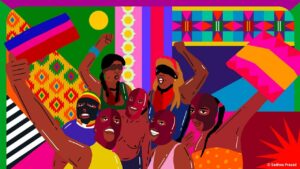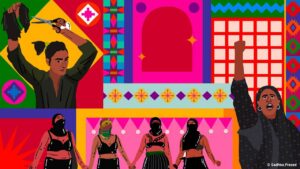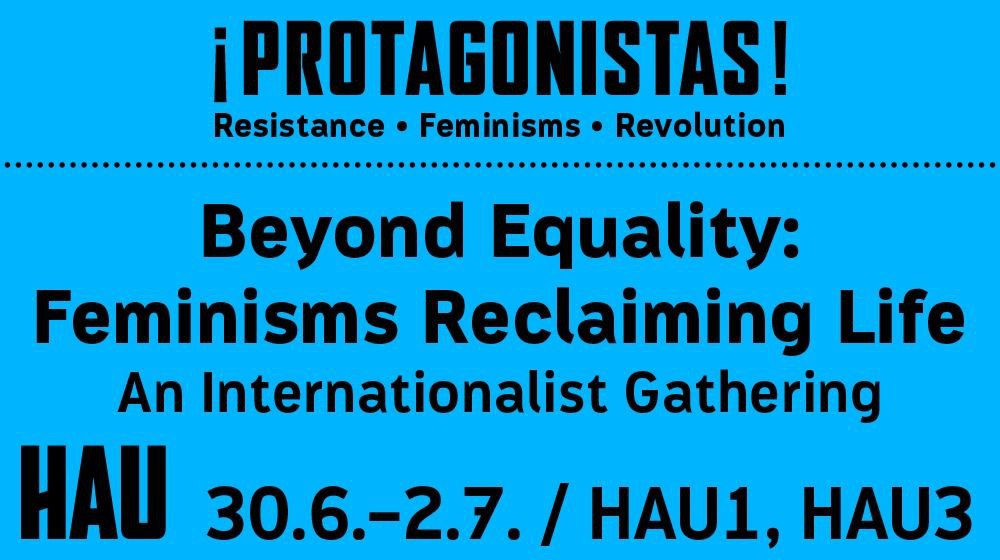Elif Sarican is a writer, curator, translator, organiser, host of the Pomegranate Podcast and one of the authors of the anthology “She Who Struggles: Revolutionary Women Who Shaped the World”. Elif spoke to The Left Berlin about the event “Beyond Equality: Feminisms Reclaiming Life – an Internationalist Gathering”, happening this upcoming weekend.

Hello, Elif, thank you for agreeing to talk with The Left Berlin today. Can you start by telling us a bit about yourself, about your work and also about your connection to “Beyond Equality: Feminisms Reclaiming Life. An Internationalist Gathering”?
My name is Elif and I’m a writer, curator and various things. I always say, etc, etc. I’m based in London, I do a lot of work on the Kurdish women’s movement. “Beyond Equality: Feminisms Reclaiming Life” came about, for me, especially through that experience, but also through some of the other work I’ve done – for example, I worked with David Graeber during my masters. And so, part of my connection to Berlin also came through the three day conference that was done at the HKW (Haus der Kulturen der Welt), based on David’s last book, which he finished before he passed away. Then, I met some of the others now on the curatorial team.
The “Beyond Equality: Feminisms Reclaiming Life” is curated by a collective based in Berlin that addresses the struggles in the Iranian Revolution, the Kurdish Liberation Movement, the diasporic and migrant movements, the feminist anti-extractivist and media and artistic articulations between Latin America and Germany. How did the idea for this event come about?
Margarita Tsomou, who is the in-house curator of the HAU, brought us together and wanted to do this. It came particularly off the back of the Women Weaving the Future conference that happened in Berlin in November, which was led by the Kurdish women’s movement. There were 800 participants and women coming from 44 different territories, and that inspired all of us to want to continue some of this work.

This internationalist gathering is also part of the festival “¡PROTAGONISTAS! Resistance Feminisms Revolution” – can you tell us more about that? What is the difference between the two events?
Protagonistas is the broad umbrella, while our conference is essentially the discourse curation of the broader festival. And the broader festival is different in that, while there’s still obviously discourse and discussions and debates; it also has performances, theatre and dance, and other elements of creative expression. During our conference there will also be some of that, particularly in the evenings, but what makes it slightly different is that it’s a concentrated two and a half days of discussions and debates, and giving space to collectives and movements.
What kind of space is HAU (Hebbel am Ufer), how is it connected to feminism and why was this the chosen place for the conference?
The space was as a result of Margarita’s relationship with HAU, and partially also because the HAU has tried to do certain feminist work for some time. It was important that, in a way, it’s a combination of that, and a continuation of the conference that happened in Berlin in November – The Women Weaving the Future conference. So yeah, we’re very, very happy that the HAU Theatre has agreed to host this. We think it’s very important that these kinds of debates are happening in institutions as such, but also with the realisation that this is not where we take our strength or power from.
Feminisms seem to have entered the mainstream agenda of western countries in the last decade, but it’s been commodified and commercialised, under a concept of “gender equality” which centres individual-focused approaches and reproducing neoliberal rhetorics and practices. Why is this not enough, why do we need to go beyond the narrative of “equality”?
We decided to call the conference Beyond Equality because we all believe in not having an equal seat at the table that is the patriarchal, capitalist, nation state system – actually, not only to create an alternative, but also supporting the alternatives that already exist. We’re not claiming to do anything new per se – what we’re merely trying to do is to make an intervention into some of the mainstream feminist discourses; a lot of these discussions already exist within movements that we’re going to be talking about throughout the conference. We see it in the last decade or so, and I think especially in Germany, with women’s equality, with this so-called feminist foreign policy, and more recently the appropriation of the slogan Jin, Jiyan, Azadî. It is not just a slogan of the Kurdish women’s movement, it’s also a political declaration for an alternative that is based on the principles of radical democracy, ecology and women’s liberation. And the reason why we believe this conference is important, as a critique to this so-called gender equality, is because we understand this strategy of liberal gender equality as an attempt to integrate certain radical elements of women’s struggle into existing systems of governance without meaningful change. And to be able to do that, these women’s struggles are made more palatable, and friendly to these systems, and the elements that don’t fit into the system are ferociously criminalised – this is exactly what we’re seeing. The so-called declaration of gender equality by some governments and states is only possible because a part of the women’s struggles are taken, and then there is an attempt to brutally crush the rest. In the case of Jin, Jiyan, Azadî, for example, the declarers of this struggle are perhaps one of the most criminalised movements in Germany. But somehow, Jin, Jiyan, Azadî sounds good to the ear and it was taken as a slogan of a friendly women’s struggle that is against Iran and therefore, is not a direct threat. This is not to say that the Kurdish women’s movement and the radical elements of it that are criminalised is a direct threat to Europe or the West, but politically and ideologically it’s clearly seen as a threat, because it’s not just about equality in this existing system – it’s about changing the system. The synthesis of all of these elements of struggle is what is seen as a threat. For Jin, Jiyan, Azadî to be put on the front of government buildings, and government funded institutions – is only possible because it’s also a way to give lip service to women’s struggle far away, and to declare that there’s no need for struggle here.
How do you make sure that certain parts of movements aren’t cherry picked to make them more accessible, and instead make people aware of the entire struggle?
The Kurdish women’s movement doesn’t see itself as the sole owners of this slogan, they are not territorial about it. What is important to recognise is that, to be able to develop this slogan, to be able to develop this political declaration, decades of struggle have gone into it – quite literally blood, sweat, and tears. And I think what is important is, of course, to be a part of the universalisation of this slogan. But for that slogan to be universalised in a meaningful way, that process needs to understand and recognise what the political declaration of the slogan is – that is, radical democracy, ecology, women’s liberation – and that it comes from an anti-colonial movement fighting for freedom. The important element is to really recognise and to talk about the history and the struggle of this movement. If you also believe in that struggle, in those principles, in those values, then I guess you would also want to talk about why this slogan is important. But the issue is that government ministers are chanting this, and I doubt that they believe in radical democracy, ecology, or women’s liberation, because their governments and their institutions continue to sell arms to some of these states, including the Turkish; they continue to be almost actionless when it comes to ecological destruction, and continue to repress women’s struggles themselves. So this is where the appropriation comes – when what you do, and the policies, don’t match the slogan.

You will be hosting a workshop on abolitionist feminism. In conversations about gendered violence, sexual assault and feminicide, it’s easy to end up engaged with narratives using a carceral framework, even within feminist movements. How can we speak about feminist justice, centring real transformative practices, without reproducing or enabling punitivist logics?
These are some very difficult questions to figure out. One element that is important, when talking about abolition, is what one’s perspective of abolition is, because some schools of thought see abolition as a step towards revolution, and some as a complete refiguring of how society relates to each other and therefore as the revolution. When we talk about the latter, it’s difficult still to create reasons for carceral solutions, because you’re talking about completely refiguring how people in society relate to each other. Obviously, there’s very real issues in terms of the violence and the threats that people face, because of the state of society. One of the important things in developing this workshop was that Nazan Üstündağ will be talking about how we can reframe certain elements of abolition in terms of self-defence as well, because that is also important for an anti-carceral approach. For example, in the case of some parts of Kurdistan, there’s the reality of ISIS – and of course, now there’s many ISIS members who are also either in prison or in camps in these areas – and what do you do with this? If they are out in the world, then they’re quite literally a threat to that entire society and particularly to women (although obviously not only women). In the workshop we’ll talk a bit about how we can really think about what we call “Feminism Unchained”, and how we can start to try to think about what that can look like, where we start and what that means. It will be very interesting, in terms of self-defence, and what the others will bring, in terms of the attempts and work that they’ve done with transformative justice and how that’s worked, and how that hasn’t worked in some ways; Sabine Hark will talk about the education system, and so on. It’s not to say that no one should go to prison now, it’s to say: how do we get to a point in which society doesn’t have this? And even now, is the existence of prisons really making us safer? They will have their interventions and there’s going to be three scenarios, and we’ll all discuss how could there be an abolitionist perspective in dealing with them. It will be abolition storytime.
Can you tell us a bit more about your views on the current feminist struggles here in Berlin and in Germany?
Some of the struggles I know the most about are struggles of what would be considered migrant communities, and the women of migrant communities. There’s so many elements of it, from certain migrant communities, from organising and fighting as care workers, to the Kurdish women’s movement – organising assemblies and trying to organise society in that sense. What I think is the reflection – and this is sadly the case in many parts of Europe – is women’s struggles are very fragmented; and this fragmentation is really a success of the system. To understand the reasons for this fragmentation and to really analyse it, there is of course many elements, but we can simplify in the name of trying to understand things. One of the key things is that there is an element of not knowing who our enemy is – and this is probably one of the biggest issues that keeps women’s movements fragmented. We often identify our enemies as very different things or places or institutions and so on. So there is much work to do, particularly in Europe, in terms of a systematic analysis of where we are, why we are there, or why we’re in the state or the position that we are, and this obviously includes practical and material situations.
About the lack of identification of the enemies, related to care work – it’s hard for people to immediately identify with care work and what it conveys, because it’s been so invisibilised. What would be strategies to bring care work to the agenda, in a way that people can relate it to their daily lives and struggles?
The important thing is making some of the connections in terms of the class, gendered and the social reasons behind this, and understanding that care work and its exploitation in particular, are quite a fundamental part of capitalist exploitation as well.
How can other feminist activists, organisers and collectives get involved in your collective’s work beyond next week’s gathering?
On Saturday evening, July 1, we will have a feminist assembly which is definitely a way to get organised. What is important about this assembly is that it’s also an avenue in which these relationships don’t have to go through us – groups, struggles and people can meet each other directly. Beyond that, we have the intention of continuing some of these discussions in a public sense, for sure. But I think what’s important to declare is that we, by no means, feel like anything needs to go through us, we’re not overstepping the function of this conference. I don’t want to say this is a big turning point – maybe it will be – but I think what’s important is that if you come to the conference, and particularly the assembly, hopefully you can meet others. If groups and movements who have never met before, and perhaps have or have not been in the same room, also get to connect, that is already a huge success for this conference.
Beyond Equality: Feminisms Reclaiming Life will happen this upcoming weekend, between 30 June and 2 July. The workshop registration is free, by email, as well as the possibility for childcare on Saturday and Sunday (email anmeldung@hebbel-am-ufer.de).
